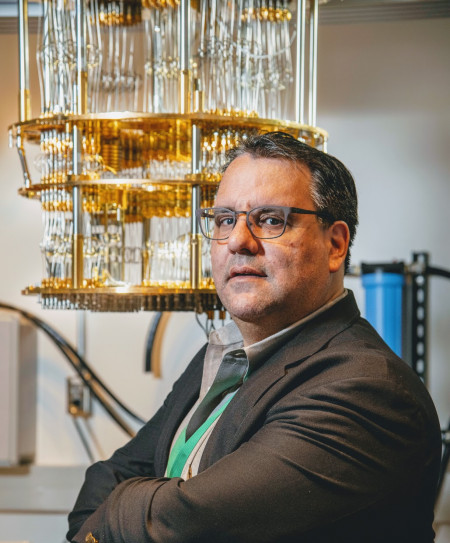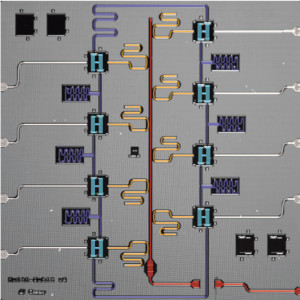David Santiago Helps Guide Berkeley Lab’s Advanced Quantum Testbed to the Next Level
September 13, 2019
By Kathy Kincade
Contact: cscomms@lbl.gov

David Santiago is science and technology lead for Berkeley Lab's Advanced Quantum Testbed. He is pictured here in front of the project's dilution refrigeration system temporarily housed on the UC Berkeley campus. (Credit: Margie Wylie/Berkeley Lab)
Since joining Lawrence Berkeley National Laboratory’s Advanced Quantum Testbed (AQT) in March 2019, David Santiago has been like an air traffic controller, steadily guiding each activity associated with the testbed through takeoffs, landings – and the occasional turbulence. As Science and Technology Lead for the AQT project, he’s excited by the progress that’s been made since the U.S. Department of Energy announced just a year ago that Berkeley Lab would receive $30 million over five years to build and operate the testbed. So far the project has yielded advances in materials characterization, control software, quantum algorithms, and high-quality, stable 8-qubit processors. The immediate next goal is to scale to 16-qubit processors.
“A lot of the work we are doing right now is getting ready for our first scale-up,” Santiago said. “We are moving slowly because some of the problems the big companies are having come from going too fast. We don’t want to do that. This is a hard problem, and it is going to take time.”
The ultimate goal of AQT is for researchers from the Lab and beyond to use the testbed and its technological innovations to explore superconducting quantum processors and evaluate how these devices can help revolutionize scientific research. The testbed is intended as an open resource for the user community, allowing researchers to work with superconducting architectures developed by staff and collaborators for simulations in chemistry, materials, and other scientific domains and help industry partners evaluate various materials and processes for new product development.

The project has so far yielded high-quality, stable 8-qubit processors; the immediate next goal is to scale to 16-qubit processors.
Toward this end, AQT has so far been focused on creating a multi-partner scientific collaboration and building a platform where basic questions about the viability of quantum computing could be studied and answered. The AQT team currently comprises Director Irfan Siddiqi, a Berkeley Lab scientist and professor of physics at UC Berkeley; Jonathan Carter, co-principal investigator and deputy of science for Berkeley Lab’s Computing Sciences Area; Kristin Balder-Froid, head of strategic development at Berkeley Lab; and Sarah Morgan, program coordinator. Also contributing to the project are Berkeley Lab’s Accelerator Technologies and Applied Physics Division, which is building a custom quantum control stack, and the Computational Research Division, which is developing software and custom classical computing architecture. In addition, a growing body of post-docs and technical staff are joining the team, both at the Lab and in Siddiqi’s Quantum Nanoelectronics Lab on the UC Berkeley campus.
“We are working to make the best quantum chips in the world to help the scientific community and advance science and accelerate discoveries,” said Santiago, a physicist who has worked in both the public and private sectors as a researcher and a consultant. “We probably have as many people and resources here as the big companies that are investing in quantum.”
Building a Quantum Information Science Ecosystem
This is not Berkeley Lab’s first foray into quantum computing and quantum information science (QIS). Over the last five years, funded by Laboratory Directed Research and Development (LDRD) grants, Berkeley Lab researchers developed quantum chemistry and optimization algorithms targeting prototype superconducting quantum processors, proving the viability of their work by running the algorithms on a quantum processor developed in Siddiqi’s lab. In 2017, the success of that LDRD-funded work paved the way for two DOE-funded projects to explore quantum computing for science. Since then, in addition to the AQT, a number of QIS projects at Berkeley Lab have attracted DOE funding. This “quantum ecosystem” now includes:
- The Molecular Foundry received two awards from the Office of Basic Energy Sciences to develop research infrastructure to advance QIS. The goal of one project is to create a nanofabrication cluster toolset, while the other is developing and integrating a unique suite of electron beam-based metrology techniques.
- In an effort funded by the Office of Basic Energy Sciences, scientists in the Materials Sciences Division are working to produce and validate the performance of functionalized quantum materials capable of supporting coherent phenomena approaching the millisecond timescale.
- Through a research program supported by the Office of High Energy Physics (HEP), a multidisciplinary team is developing sensors that enlist properties of quantum physics to probe for dark matter particles in new ways, with increased sensitivity and in previously unexplored energy regimes.
- HEP is also supporting Berkeley Lab efforts to develop quantum algorithms and simulations for properties like information scrambling and error correction that are relevant to black hole theories and to quantum computing involving highly connected arrays of superconducting qubits; computer programs that test the interactions between fundamental particles in extreme detail; and quantum-based algorithms for pattern recognition to reconstruct charged particles. In addition, the Accelerator Technology and Applied Physics Division is developing specialized tools and logic families for HEP-focused quantum computing.
- A project funded by the Office of Basic Energy Sciences and co-led by the Computational Research Division is combining the power of conventional computing and quantum hardware to tackle complex chemistry topics such as catalysis, photocatalysis, actinide chemistry, and related fields.
- The Center for Novel Pathways to Quantum Coherence in Materials, a multi-institutional Energy Frontier Research Center funded by DOE and led by the Materials Science Division, targets expanding our understanding and ability to control coherence in solids by building on recent discoveries in quantum materials along with advances in experimental and computational techniques.
“AQT is essentially the next phase of our research to deploy quantum computing resources that are highly customizable for scientific applications,” Carter said. “This is something that started with an LDRD and continued with the Advanced Quantum-Enabled Simulation Pathfinder project.”
Santiago likens the current quantum computing R&D climate to that of the evolution of many revolutionary technologies.
“When Maxwell worked out the laws of electromagnetics, he didn’t know we were one day going to have cellular communications; it was just something to show how magnetism works and how electricity works,” he said. “And when classical computers were originally built they were to calculate trigonometry and logarithm tables, and they had to do it fast for military purposes and people couldn’t fathom that we were going to have this in our hands. This happens with all technologies; if you show you have developed a really useful technology and you demonstrate why it is useful over time, it expands your ideas.”
In addition to supporting the swath of quantum computing, networking, and QIS projects taking place across the Lab, on the UC Berkeley campus, and in conjunction with other user facilities, AQT has purchased its first refrigerator, a Bluefors system currently housed in Siddiqi’s lab on the UC Berkeley campus. Plans are under way to refurbish Berkeley Lab’s Building 73 and turn it into QIS R&D hub; once this work is completed, likely in 2020, the refrigerator will be moved to that facility and users will be able to begin running experiments both onsite and remotely. Ultimately, Santiago expects the testbed to expand capacity, with an eye toward becoming a scientific community user facility in addition to producing high-quality quantum processors.
“We want to be the first to build the most advanced quantum processor with high-fidelity operations,” he said. “Once we get to larger and more powerful processors, whatever happens after that is going to be something unimaginable and powerful and beneficial to society.”
Related reading:
About Computing Sciences at Berkeley Lab
High performance computing plays a critical role in scientific discovery. Researchers increasingly rely on advances in computer science, mathematics, computational science, data science, and large-scale computing and networking to increase our understanding of ourselves, our planet, and our universe. Berkeley Lab’s Computing Sciences Area researches, develops, and deploys new foundations, tools, and technologies to meet these needs and to advance research across a broad range of scientific disciplines.







 Instagram
Instagram YouTube
YouTube